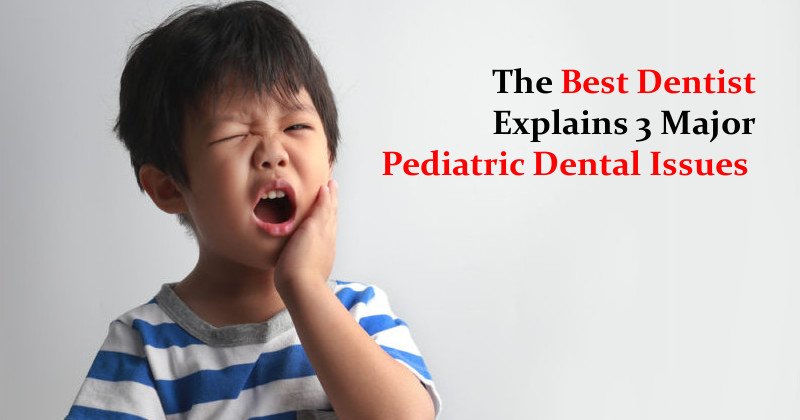Childhood is a time of exploration, advancement, and adventure. However, even adults, let alone children, often tend to ignore the health of their teeth. Many fail to realize that unusual pediatric dental issues might arise during these years of exploration – a climb on the jungle gym could result in a damaged tooth, or a cavity could grow from a missed area of plaque. But worry not, for we’ve got you covered! Here is your opportunity to learn about the 3 major Pediatric Dental Issues.
3 Major Pediatric Dental Issues
Breath Problems:
Bad breath, often known as halitosis, can affect people of all ages. Chronic bad breath in children, on the other hand, could indicate something more serious than merely consuming stinky foods.
Halitosis is caused by bacteria that live in the mouth. These bacteria colonies feed on leftover food, fluid, and plaque, creating hydrogen sulfide, which gives the mouth a bad odor. Children’s bad breath, like that of adults, is most common in the morning after they get up. During the night, bacteria multiply in the mouth, resulting in “morning breath.” If your child’s bad breath persists throughout the day, it’s most likely a sign of something more serious.
Bacterial buildup in the mouth can be produced by a number of factors. The most common causes of halitosis include gum disease, poor dental care, and dry mouth. Strange-smelling breath might occur as a result of the way medicine breaks down in the body. Maintaining adequate dental hygiene is the most effective way to treat and prevent bad breath. Brushing your tongue can help you fight bacteria in your mouth, and using an antibacterial mouthwash can help you get rid of odors.
Tooth Decay:
Tooth decay is one of the most common chronic pediatric disorders in India. At least one untreated rotting or decaying tooth affects 20% of children aged five to eleven, while 13% of teenagers have the same problem.
Rotten teeth are caused by bacteria that live and thrive in the mouth. Plaque is a sticky, film-like bacterial buildup on teeth that develops over time. If plaque is exposed to the right foods, it will develop acids and eat away at a tooth’s enamel, or the hard outer surface of the teeth. Because of the plaque’s stickiness, the acids remain in constant contact with the tooth’s surface, gradually decaying the tooth.
Plaque development and tooth decay are aided by carbohydrate-rich diets. Candy, cookies, soda, and fruit juice are just a few of the most prevalent problem foods for kids. Cooked carbs including pasta, rice, potatoes, and bread also enhance plaque deposition. A carbohydrate-rich diet mixed with inconsistent brushing habits might lead to tooth decay.
The good news is that tooth decay is a preventable condition. Tooth decay can be significantly decreased if a child brushes his or her teeth properly and visits the dentist on a regular basis. Brush your child’s teeth twice a day with an approved fluoride toothpaste, and make sure they floss before bed. Sugary foods should be consumed in moderation, especially before bedtime.
Sensitivity Of The Teeth:
Another common pediatric Dental Issues is sensitive teeth. If hot or cold foods and beverages irritate and hurt your child’s teeth, he or she may have sensitive teeth. Even breathing in cold or hot air could induce discomfort. Sensitive teeth aren’t always a bad thing, but they can signal a more serious Dental Issues.
Many people identify sensitive teeth with the elderly, however the condition can also affect children. Plaque and acid can swiftly wear down children’s enamel, which is weaker than that of adults. As enamel wears away, a child’s gums may recede, and fissures on the tooth surface may occur, exposing nerve endings. When someone drinks or consumes something hot or cold, the sensitive nerve endings are activated, resulting in pain. Sensitive teeth could indicate cavities or decay that hasn’t been treated.
However, dentists can harden the enamel and fill any holes in the teeth with a sealant to prevent them from sensitivity. Give your youngster a soft-bristled toothbrush to use at home because harsh bristles can scrape off enamel and produce small cracks over time.
Many pediatric Dental Issues can now impact children. The easiest method to avoid them is to make sure your youngster brushes and flosses their teeth completely. Also, make sure your youngster eats a balanced diet. As a result, you’ll be able to safeguard your child from existing pediatric Dental Issues
For detailed information regarding Dental Issues, you should visit dental clinic in Gurgaon today.







